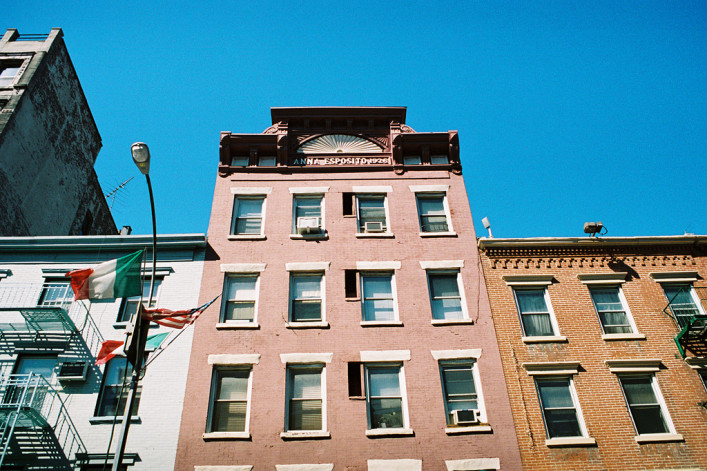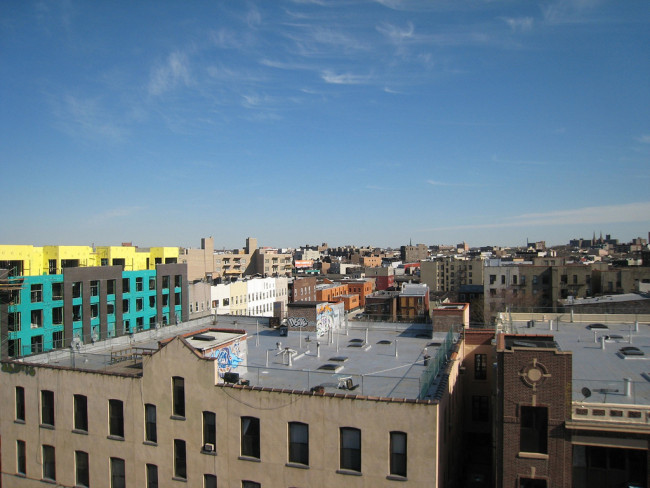Why 2017 could be make-or-break for New York's affordable HDFC co-ops
2017 is shaping up to be a year of many real estate battles, and a major one to watch will be the debate over the fate of the city's affordable HDFC co-ops. (HDFC stands for Housing Development Fund Corporation, a type of housing meant to be priced below market value to make them affordable.)
As Mayor Bill de Blasio struggles to meet his proposed affordable housing goals—and public ire rises over stories like the New York Times profile of a wealthy twentysomething using her parents' cash to buy into a Williamsburg HDFC—these relatively rare, low-priced co-ops have found themselves suddenly in the spotlight.
The heat's likely to intensify, thanks to the Department of Housing Preservation and Development's controversial proposed changes to the regulatory agreement that governs HDFCs. Announced last fall, the unexpectedly sweeping overhaul to the program has been met with a huge amount of blowback from HDFC shareholders, some local politicians and advocates within the housing community who say the new rules go too far, and ignore both the input and hard work of shareholders.
Below a rundown of the proposed changes, the (many) criticisms of the city's proposal, and what's next on the docket for 2017:
What might change for HDFCs
With the tax breaks for HDFCs set to expire in 2029—and an increasing number of these units starting to sell off at higher prices—the city is seizing the opportunity to update the rules to the program and to take action even earlier than the deadline. And while the proposed new regulatory agreement (detailed here by the Urban Homesteading Assistance Board, or UHAB) would include steeper tax breaks than those currently offered by the DAMP (Division of Alternative Management Programs) tax cap, it would also end the current tax abatement early, and only offer discounts to buildings that sign onto the new agreement.
Currently, HDFCs receive reduced tax rates via the DAMP tax cap in order to keep maintenance costs manageable for shareholders, so having this tax benefit revoked if a building doesn't sign on could spell spiraling costs for both boards and shareholders alike—not exactly a boon to affordability.
Unsurprisingly, many shareholders see this as the city dramatically changing course on a deal that was signed on both sides decades ago. "I don't see why a car dealer cannot go back on a contract, but a city agency can," says Ayo Harrington, a longtime HDFC shareholder who founded LES HDFCs, and also sits on the Task Force on HDFCs—not to be confused with the HDFC Task Force, which is a separate entity altogether. (The Task Force Harrington sits on originally recommended changes to the HDFC program in 2014, but members say the city's recent proposal is more extreme than anything they had initially proposed.)
Among other things, the new regulatory agreement would include strict price caps for sales, while also "carving out" exceptions for apartments that were already purchased at a higher price. (Many HDFC buildings currently have their own price caps in place—in addition to flip taxes that discourage re-selling at inflated prices—but under the new rules, price caps would be mandatory.) The idea here is to prevent any buyers from losing equity on apartments they've already bought—and these shareholders would still be selling at a relatively low profit margin compared to market rates—but shareholders have also expressed concerns that such a system would exacerbate a class divide in buildings, rewarding unaffordable sales prices, while preventing shareholders of lower-priced co-ops from selling at increasingly enticing higher prices.
For instance, while that Williamsburg twentysomething would be able to eventually re-sell her apartment for equivalent to or more than her original six figure purchase price, a neighbor with an exactly equivalent apartment might find themselves stuck with a price cap several hundred thousand dollars lower. "A lot of complaints have been made that HPD is putting so much effort into carving out exceptions for these units, so there would be a much higher sales cap allowed," says Harrington. "And it's giving the signal to the original shareholders, 'I can sell my unit for a quarter of a million dollars and get out of here'."
There's also a stringent primary residence requirement stating that shareholders would need to spend 270 nights per year in their units (as opposed to just 180 days, or six months required for primary residence in a rent-stabilized units), a rule meant to prevent owners of affordable units from letting them sit empty that could wind up penalizing shareholders who travel frequently for work or to visit family.
Most pressing, however, is the issue of mandatory third-party monitoring for all HDFC co-ops receiving tax breaks, a requirement Samantha Kattan of UHAB calls "paternalistic." This would mean bringing outside monitors such as UHAB, which already does this service for a number of HDFCs throughout the city, to facilitate board elections, approve sales, etc., even for buildings that have been functioning well on their own. (While UHAB is generally in favor of monitoring, their stance is that the requirements as they're currently laid out in the plan are overly punitive.)
"To a certain extent, we agree with some of the shareholders who are being really vocal against this whole proposal," says Kattan. "The draft of the regulatory agreement is a lot more restrictive than any regulatory agreement we've seen before. They sort of took the idea of increasing oversight and took it a lot further than we suggested."
Why shareholders and housing advocates are upset
Nearly everyone involved in the world of HDFCs has issues with HPD's proposed regulatory agreement as it currently stands, though many of them for different reasons. (Some politicians including Gale Brewer, Corey Johnson, and Mark Levine have also gone on record with their qualms about the changes to the regulatory agreement.) For instance, while UHAB and other organizations would like price caps on sales to be even lower, the HDFC Coalition is opposed to these caps, on the grounds that many shareholders worked for years to fix up neglected buildings and should be allowed to cash in on that equity if they so choose. Presumably, more recent buyers who paid higher prices aren't too keen on the caps, either.
"The HDFC Coalition firmly believes in the right of self-determination for all HDFCs, and this applies to price caps as well," says Coalition member John McBride. "Some HDFCs have voted to create internal price caps for their buildings without a regulatory agreement, and we fully support their right to do so. Other shareholders in HDFCs have invested hugely in turning their buildings from failures into success stories by working diligently for decades within the rules, and they demand to have the equity they have earned with their own money and own two hands protected, and we support them as well."
In other words, longtime shareholders who put in years of sweat equity should be allowed to cash in if they so choose, and the option to stay affordable should be up to the buildings themselves.
On the flip side, says Harrington, "There are many who believe the resale price cap being proposed by HPD is too high. Some don’t want any. We believe that the intent of the law when we moved in, which was pounded into our heads when we moved in by HPD, was that the unit should be affordable when a family moves in, and then affordable for a new buyer when that family moves out."
The price caps are laid out in an elaborate chart in HPD's proposed regulatory agreement, but range between $286,296 to $1.4 million depending on apartment size and year. By comparison, Harrington says apartments in her building trade for well below $50,000.
UHAB and other organizations are also pushing for a 100 percent tax exemption for HDFCs, even higher than what's currently being offered, which is a sliding scale of cuts based on a formula based in part on assessed value (you can check out the full explanation here). Another dispute centers around the aforementioned "carve-out" for more expensive units, as well as a push for a "carve-in" to protect longtime shareholders who might not be able to afford increasingly expensive monthlies in their buildings.
But perhaps one of the biggest issues to rile tenants is the mandatory monitoring, which could be useful to the financially distressed buildings in the system, but feels condescending and disempowering to buildings that have been successfully running their own affairs for years.
"Instead of giving help and guidelines, this proposal is taking the viewpoint that there have been all these problems in these buildings, and we're going to sort of police them," says UHAB's Andy Reicher. "And that's where the tone is wrong. These people have taken on the city's worst housing, and have been improving and running their buildings under difficult circumstances and providing affordable housing. They ought to be recognized, and the regulatory agreement ought to be there to make things easier for them."
More to the point, says Reicher, while there are some HDFCs that are poorly run, have fallen into disrepair, or trade formerly affordable apartments for six-figure prices, "most of the buildings are doing just fine, and are providing the bulk of this housing."
"While it's a credit to the de Blasio administration that they're taking steps forward to preserve these units, I think they could have done a better job at outreach," says Dan Cohen of the New York Housing Partnership. "And that has undermined the cause, and galvanized shareholders into feeling like they were left out of the process."
The one-size-fits-all nature of the agreement—and lack of clarity about the details of the enforcement—seem to be the biggest sticking points moving forward. "Mostly, everybody is concerned with the monitor and manager situation," says Harrington. "The problem is the same problem as with the rest of the regulatory agreement. The way it's written is not clear."
She adds that the whole arrangement would likely have been more palatable to shareholders "if the regulatory agreement had a cover letter attached that acknowledged the hard work shareholders have done toward the improvement of these buildings and communities, and explained the needs of buildings, and rolled out their plans to preserve affordable housing."
If you want to delve into details further, the HDFC Coalition has a position paper on the new rules here, and UHAB has an official response here.
What's the next step?
While the city was initially fast-tracking the new agreement, after all this outcry, when it will be up for discussion is now unclear. (We've reached out to HPD for comment and will update if we hear back.)
"It looks like HPD is slowing down their timeline," says Kattan. "They had initially said they would take it to the City Council by the end of 2016 or early 2017, but they haven't even scheduled any of their planned outreach meetings yet, so they're likely scheduling some public forums in the next few months."
"We're hoping that this slowing down means they're taking some of this input into account and might come back to talk and offer an updated agreement," she adds.
Debra Bechtel, a Brooklyn Law professor who works extensively with HDFCs and is a member of the Task Force, says HPD has indicated they'll do some revisions. "What we don't know is when and to what extent," she says. "I imagine they'll revise the regulatory agreement, and I'm guessing that wouldn't take any less than three or four months." (However, notes Cohen, the city is in the process of vetting potential companies to act as monitors for buildings, meaning that plans are still in motion.)
For now, the HDFC Coalition is encouraging shareholders to contact their local council members as well as the speaker, Melissa Mark-Viverito, to block any legislation that would pre-empt the current rules. Of UHAB, Kattan says: "We're not happy with the regulatory agreement, but we're not in support of the status quo. We've been pushing for an updated draft that responds to some of the feedback we've given them and from other shareholders in public forums."
And if the city is hoping to preserve these co-ops as much-needed affordable housing, they'll need cooperation from shareholders, which likely means numerous more meetings and public forums in the next year. "That HDFCs have to vote in favor of the regulatory agreement, or lose their tax exemption is extreme," says Cohen. "You run the risk that some HDFCs will opt to take themselves out of tax exemption, which could trigger significant losses of affordable units."
Adds Harrington: "Of all of the meetings I've been to, I haven't heard a single person say that they would sign it."
You Might Also Like



























